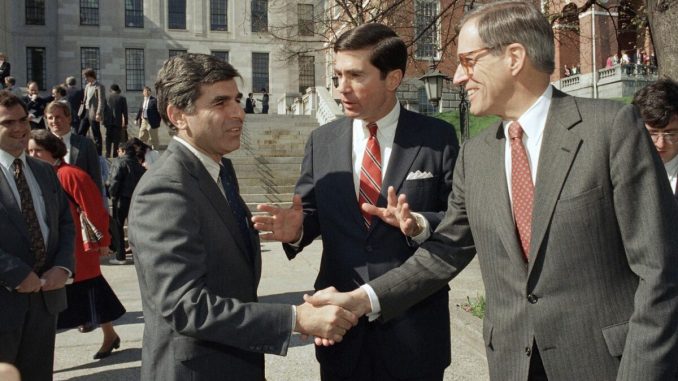
WILMINGTON, Del.—Pierre S. “Pete” du Pont IV, a former Delaware governor and congressman who sought the Republican presidential nomination in 1988, has died. He was 86.
Du Pont, a scion of the family that established the DuPont Co., died at his home in Wilmington, Delaware, on Saturday after a long illness, his former chief of staff, Bob Perkins, said.
Born to wealth and status, du Pont broke with family tradition in the 1960s, forgoing a comfortable career with his family’s chemical company for a life in politics.
“I was born with a well-known name and genuine opportunity. I hope I have lived up to both,” du Pont said in announcing his longshot presidential bid in September 1986.
As a presidential candidate, du Pont attracted attention for staking out controversial positions on what he hoped would reverberate with voters as “damn right” issues. They included random drug testing for high school students, school vouchers, replacing welfare with work, ending farm subsidies, and allowing workers to invest in individual retirement accounts as an alternative to Social Security.
Some of those ideas have since become more mainstream.
He won the endorsement of New Hampshire’s largest newspaper but failed to gain traction among voters. He ended his campaign after finishing next-to-last in the Iowa caucuses and the New Hampshire primary.
Afterward, du Pont remained engaged in politics. He frequently wrote opinion pieces for publications such as the Wall Street Journal and co-founded the online public policy journal IntellectualCapital.com. He also served as chairman of Hudson Institute, the National Review Institute and the National Center for Policy Analysis, a nonpartisan public policy research organization.
Pierre du Pont IV was born Jan. 22, 1935, in Delaware. After attending Phillips Exeter Academy in New Hampshire, he graduated from Princeton University in 1956 with an engineering degree. Following a four-year stint in the Navy, he obtained a law degree from Harvard University in 1963.
He joined the Du Pont Company, where he held several positions, resigning as a quality control supervisor in 1968 to begin his political career.

After running unopposed for a state House seat in 1968, he immediately set his sights on Congress, running as a fiscal conservative and winning the first of three terms in 1970.
Elected governor in 1976, du Pont fought successfully to restore financial integrity to a state he had declared “bankrupt” shortly after his inauguration. He presided over two income tax cuts; constitutional amendments restricting state spending and requiring three-fifths votes in the legislature to raise taxes; and establishment of an independent revenue forecasting panel.
After a rocky start with Democratic legislators, including an override of a 1977 budget veto, du Pont forged successful relationships with lawmakers from both parties to tackle thorny issues including prison overcrowding and corruption and school desegregation. He was re-elected in a landslide in 1980, winning a record 71 percent of the vote and becoming the first two-term governor in Delaware in 20 years.
In his second term, du Pont signed legislation that loosened Delaware’s banking laws, including removing the cap on interest rates that banks could charge customers. The Financial Center Development Act made Delaware a haven for some of the country’s largest credit card issuers.
Under du Pont’s leadership, Delaware also established a nonprofit employment counseling and job placement program for Delaware high school seniors not bound for college. It served as the model for a national program adopted by several other states.
Prohibited by law from seeking a third term, du Pont briefly withdrew to the private sector, joining a Wilmington law firm in 1985. A year and a half later, he announced his bid for the GOP presidential nomination, becoming the first declared candidate in the 1988 campaign.
During an appearance at the Hotel du Pont in downtown Wilmington, where du Pont announced he was abandoning his presidential campaign, he praised an electoral process that gave a shot at the White House to a former small-state governor with unorthodox ideas.
“You’ve given me the opportunity of a lifetime. You listened, you considered and you chose. I could not have asked for any more,” du Pont said. “For in America, we do not promise that everyone wins, only that everyone gets a chance to try.”
Du Pont is survived by his wife of over 60 years, the former Elise R. Wood; a daughter and three sons; and 10 grandchildren.
Due to the coronavirus pandemic, a memorial service will be held at a later date, Perkins said.





Be the first to comment